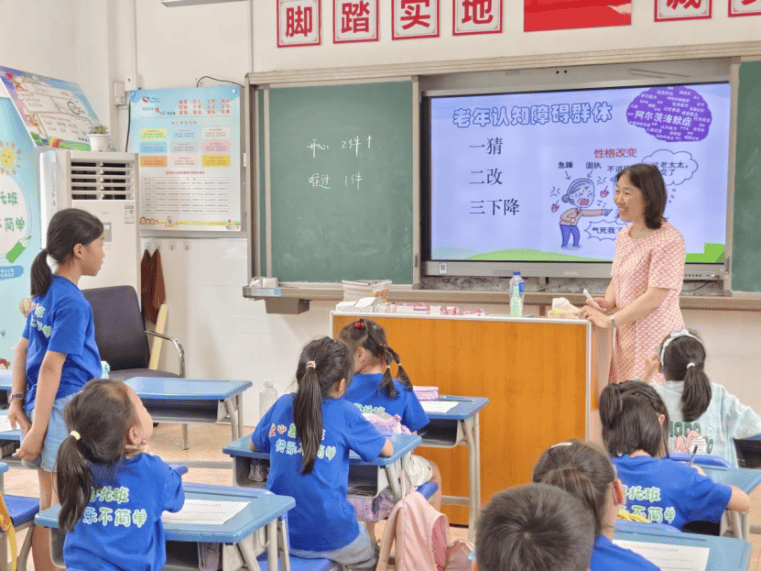Students
“Teacher, can this disease be cured?” a child raised his hand, stood up from his seat, and asked.
Teacher
“No, this disease can only be alleviated by some preventive measures.” the teacher at the podium replied.
This is a scene from the old-age cognitive impairment publicity and popular science activity conducted at Songze School in Zhaoxiang Town during this year’s summer vacation. Experts from the field of old-age cognitive impairment were telling more than 20 summer school children about some manifestations and symptoms of Alzheimer’s disease, that is, “first guess, second change, third decline, fourth confusion.” “First guess is when the elderly become suspicious and distrustful, second change is when their behavior and personality change, third decline is the decrease in self-motivation, self-care ability, understanding, and judgement ability, fourth confusion refers to confusion in counting, speaking, direction finding, and memory.”
Leading with innocence, paying attention to cognitive impairment
In the warm and loving popular science activities, the children showed their concern for Alzheimer’s disease, a common old-age illness. Their active questioning enlivened the classroom atmosphere, and the teacher’s words gently nurtured the children’s hearts, teaching them how to better understand and help the elderly around them, becoming a little sun in their late years through companionship.
Since the start of the pilot project for building dementia-friendly communities for the elderly in 2021, Zhaoxiang Town has expanded its coverage from initially one village to the entire town at present. The project significantly improved the public’s awareness and attention to old-age cognitive impairment, creating a more welcoming and inclusive community environment for a large number of elderly patients, bringing care and warmth to their doorsteps. They no longer feel lonely and helpless, the care and support from all sectors of society have greatly helped alleviate the practical difficulties of elderly people with cognitive impairment and their families.
Caring together, building a support network
In the social work station of Zhaoxiang Town, a dedicated and intimate support center for elderly cognitive impairment has been established. It serves not only as a fixed service point but also as a bridge for daily guidance and care for the elderly cognitive impairment group. Friendly units such as supermarkets, banks, convenience stores, etc., closely cooperate with the community to actively provide caring services for the elderly, creating a community atmosphere full of love.
Furthermore, with professional caregivers and grassroots backbone forces in the community as the core, Zhaoxiang Town has established a professional volunteer team friendly to cognitive impairment, with all caregivers certified, nearly half of whom hold intermediate to advanced certificates; the community backbone stresses the mode of “bringing old with old” and “backbone leadership”, formed jointly by elderly peers and staff members. As the backbone of the project, volunteers cleverly integrate cognitive impairment popular science and screening into daily services through hard work and selfless dedication, providing training activities and early care for elderly people with cognitive impairment, offering knowledge and skill support to family members to better help them understand and cope with elderly cognitive impairment issues.
By patiently communicating with the elderly, answering their doubts with professional knowledge, every meticulous service provided by the caregivers can effectively delay cognitive decline and improve the quality of life for the elderly. The community backbone actively functions as a link, helping elderly people with cognitive impairment connect with more social resources and guiding various sectors to jointly build a dementia-friendly community for the elderly.
The head of the town’s social work station stated that in the future, Zhaoxiang Town will continue to deepen and expand various elderly cognitive impairment services, strengthen cooperation and communication with various communities, institutions, and social organizations, engage the whole society, awaken memories with love, and jointly promote the construction and development of a dementia-friendly community for the elderly.
Reporter: Xu Jiaqing (Chief Grassroots)
Photographer: Xu Jiaqing (Chief Grassroots)
Editor: Yu Jingyan
Responsible editor: Shen Weiqun (Chief)
Final review: Zhao Lan


